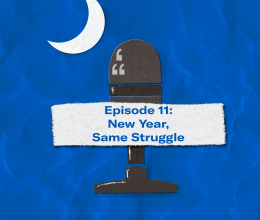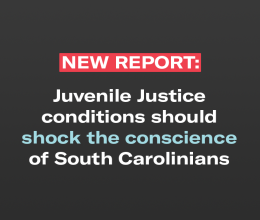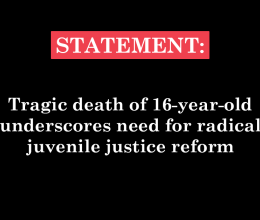
Senate Bill 266 would decrease the length of time that children may be held for “status offenses,” or offenses that would not be considered punishable if they were committed by an adult. Examples of status offenses include truancy and running away from home.
The bill requires a child and their family to seek counseling when a child is charged with incorrigibility, defined as a pattern of serious or persistent misbehavior. With some exceptions, the bill also requires the expungement of juveniles’ records for status offenses, allowing children to enter adulthood with a clean slate.
We support this bill because:
All too often, the state of South Carolina criminalizes children – especially Black children – and removes them from their communities for behavior issues that do not pose a threat to those around them. Rather than provide resources that help children get their lives on track, we have pushed them into a school-to-prison pipeline. The South Carolina Department of Juvenile Justice (DJJ) is often the first stop in that pipeline.
Meanwhile, the DJJ needs a radical overhaul. Its facilities are meant to be sites of rehabilitation, but instead they have been sites of violence, isolation, and unsanitary living conditions. The patterns of neglect and inhumane deprivations are well-documented, including in our ongoing lawsuit against DJJ. Part of the problem is that DJJ facilities are understaffed and overcrowded. By reducing the number of children held in these facilities for status offenses, we can reduce the strain on DJJ employees and help ensure the children in custody receive the care they need.
We aren’t just casting stones here. Leaders from DJJ have come out in favor of S. 266. Fixing DJJ will take hard work and radical reform, but we are in agreement that this bill is an important first step.
The latest:
S. 266 received a favorable report from a Senate Judiciary subcommittee on March 20, 2024. It will receive a hearing from the full Judiciary Committee next.
Take action:
Use this form to contact the Senate Judiciary Committee chair and the state senator from your district. We’ve included some details about the bill, but feel free to customize the email and make sure your voice is heard.






